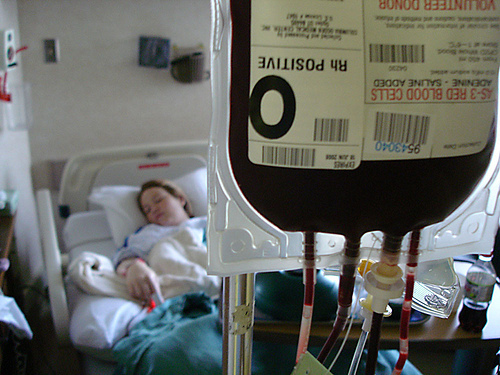The Food and Drug Administration (FDA) said Tuesday it will reverse a 31-year-old gay blood ban with a new policy barring donations from men who have had gay sex in the previous year. FDA officials said that policy is supported by research and would put the U.S. in-line with other countries including Australia, Japan and the U.K., the Associated Press reported.
Shortly following the FDA's announcement, the New York Times published an article with the erroneous headline: "F.D.A. Lifting Ban on Gay Blood Donors." The article said, in part: "The Food and Drug Administration announced on Tuesday that it would scrap a decades-old lifetime prohibition on blood donation by gay and bisexual men, a change that experts said was long overdue and could lift the annual blood supply by as much as 4 percent."
The data missing in the headline and first paragraph was substantial: only gay men who have been celibate for a year would be allowed to participate in the blood donation program.
"Congratulations -- we can now donate blood, as long as we have been celibate for 12 months. What a win! We got de-sexualized in the name of 'science.' This is not a win, not for our community. This is a slap in the face," HIV activist and journalist based in Lansing, Todd Heywood, said of the FDA announcement.
"It is important to note that I do believe that the ban is irrational, but our moves to address it while ignoring the raging epidemic among us is both misguided and irresponsible," Heywood added. "I should also note that if the FDA wanted, there is technology to virtually eliminate HIV transmission via blood transfusion with current lab tests and techniques available."
All blood donations are screened for HIV, however, the test currently being used only detects the virus after it's been in the bloodstream about 10 days. That allows a brief window when the virus that causes AIDS can go undetected.
According to government figures, men who have had sex with other men represent about 2 percent of the U.S. population, yet account for at least 62 percent of all new HIV infections in the U.S.
The FDA implemented the ban in 1983, when health officials were first recognizing the risk of contracting AIDS via blood transfusions. Under the policy, blood donations are barred from any man who has had sex with another man at any time since 1977 -- the start of the AIDS epidemic in the U.S.
Slate's Mark Joseph Stern wrote: "...the FDA remains trapped in the '80s -- terrified of gay men and their diseased, untrustworthy ways. Perhaps in another 31 years, we'll see the FDA move to a sensible, nondiscriminatory rule. For now, we're stuck with this embarrassing, unscientific half-measure.
U.S. Senator Patty Murray (D-WA) told her constituents, "Today's announcement is a welcome step in the right direction. However, I am disappointed that low-risk gay men are still being discriminated against with this outdated policy. Healthy Americans who don't engage in risky behavior, regardless of their sexual orientation, should have the opportunity to donate blood and help in the effort to save lives. I look forward to working with Secretary Burwell to build on the step taken today by removing this discriminatory ban while keeping our blood supply safe."
Murray had previously called for a re-examination of the outdated policy in 2012.
Respected organizations are calling on the FDA and HHS Secretary Burwell to implement a risk-based blood donation policy, regardless of sexual orientation or gender identity, and to stop perpetuating the stigma and discrimination driving the HIV/AIDS epidemic.
Gay Men's Health Crisis (GMHC) released a statement saying that the new policy announced by the FDA related to gay and bisexual men donating blood is offensive and harmful.
"Today, the FDA finally announced that gay and bisexual men may finally be allowed to donate blood -- but only if they are celibate for one year, regardless of their risk for HIV. However, this new policy does not require heterosexual blood donors to be celibate for one year. Some may believe this is a step forward, but in reality, requiring celibacy for a year is a de facto lifetime ban," the statement read.
The New York-based organization cited discrimination as a main component in dealing with discussions around the topic of HIV infection.
"Since the first days of epidemic, GMHC has witnessed first-hand how fear, stigma, and discrimination have fueled the spread of HIV. By implementing this policy, the FDA will continue to fan the flames of the outdated stereotype that HIV is only a 'gay disease.' The American Medical Association, the Red Cross, America's Blood Centers, and the Association of Blood Banks agree that the lifetime ban is not only discriminatory but is also medically and scientifically unwarranted," the statement continued. "HIV is transmitted by what you do, not who you are."
"Stereotypes should have no place in saving lives," said GLAAD President & CEO Sarah Kate Ellis. "While this proposed change is certainly historic, it would still mean that countless gay and bisexual men will be turned away from blood banks simply because of who they are."
"This is a step in the right direction, but blood donation policy should be based on current scientific knowledge and experience, not unfounded fear, generalizations and stereotypes," Lambda Legal Senior Attorney Scott Schoettes said. Schoettes is also a director of the HIV Project. "Within 45 days of exposure, currently required blood donation testing detects all known serious blood-borne pathogens, including HIV. Therefore, a deferral of more than two months -- for anyone -- is not necessary and does not noticeably enhance the safety of the blood supply."

